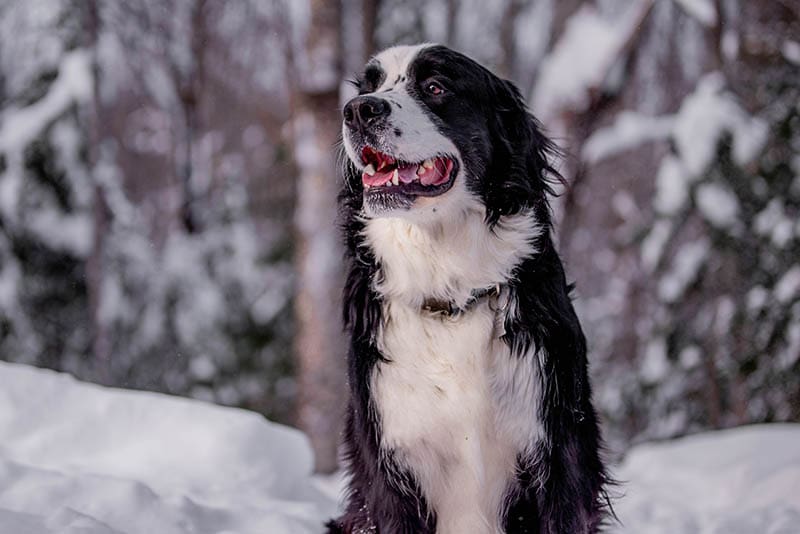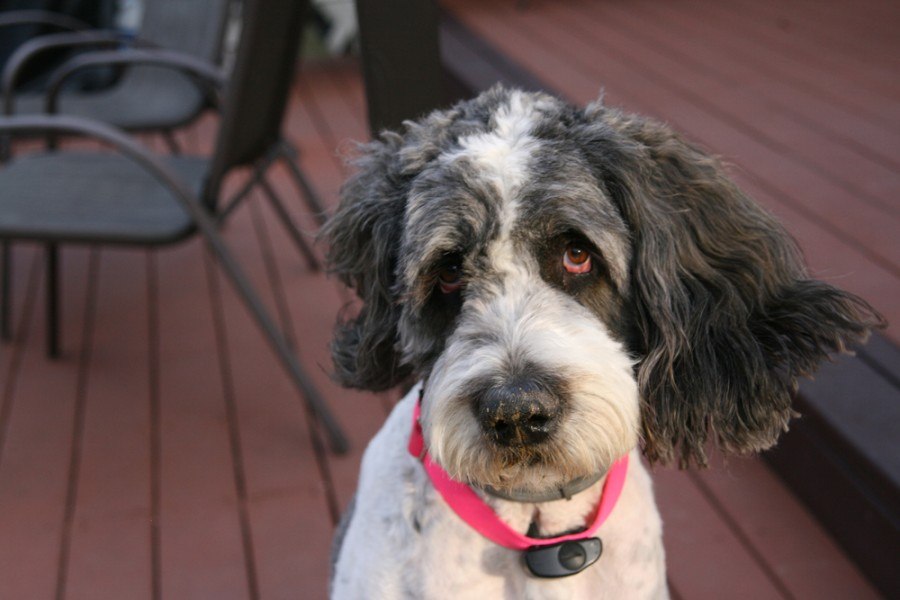Chin-Wa (Japanese Chin & Chihuahua Mix): Info, Pictures, Characteristics & Facts

Updated on
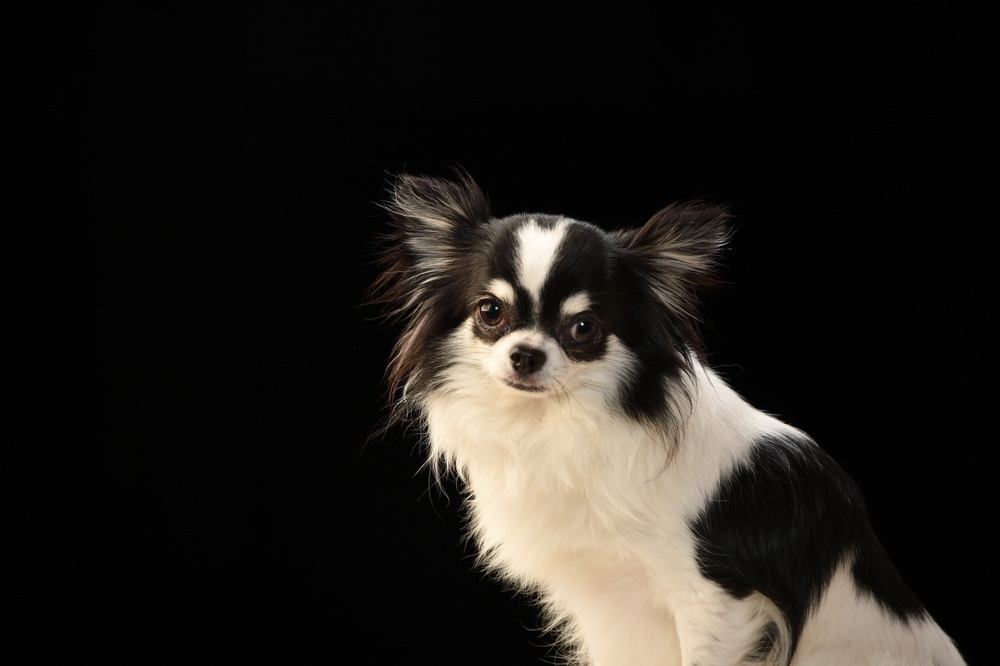
| Height: | 10–11 inches |
| Weight: | 4–8 pounds |
| Lifespan: | 10–12 years |
| Colors: | Black, white, cream, red, brown |
| Suitable for: | Watchdogs, apartment living, experienced dog owners, families without children |
| Temperament: | Happy, vocal, affectionate, impatient |
The Chin-Wa is a hybrid mix of a Japanese Chin and a Chihuahua. They can also be called the Chi-Chin. Since both of their parents are tiny breed dogs, the Chin-Wa follows suit and is considered a toy breed.
They can come in a variety of coat colors and patterns, and their hair ranges from short to long but is always straight. They are a low-maintenance breed when it comes to grooming and exercise. Both the Chihuahua and the Chin exhibit stubborn characteristics, so their offspring can also be challenging to train.
 Chin-Wa Puppies
Chin-Wa Puppies
Chin-Was are slightly more popular in the United Kingdom, so it’s important to take your time to find a reputable breeder since there might not be so many in the U.S. Breeders with a good reputation gain it by practicing healthy breeding habits and producing quality pups that consistently fit under the accepted breed standard. To figure out if your breeder follows best breeding practices, ask them for their parent pups’ health information and to have a tour around their breeding facility.
Since both the Japanese Chin and the Chihuahua are popular dogs, their puppy mixes are not too expensive. Finding one of these pups at a dog shelter might not be so hard, so try visiting a few dog shelters.
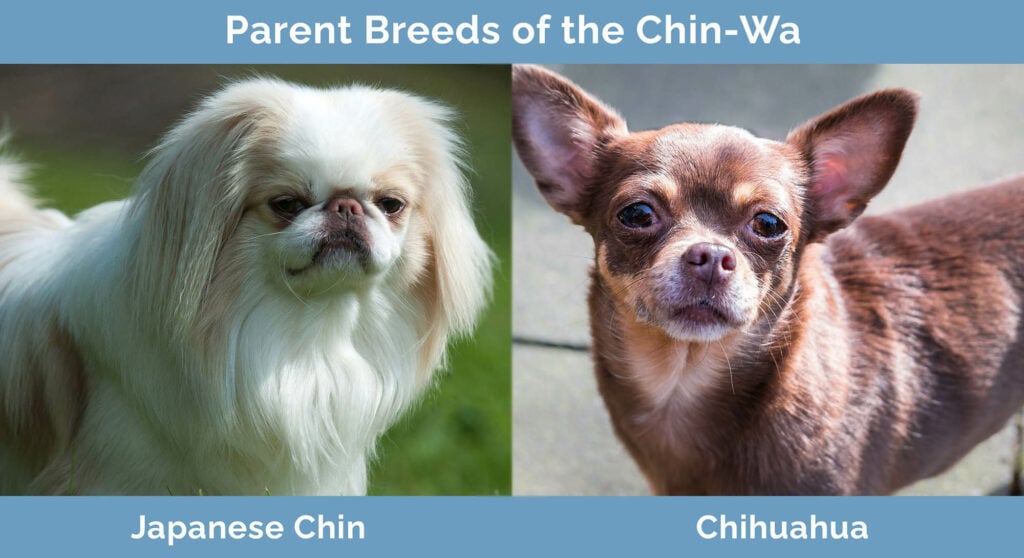
Temperament & Intelligence of the Chin-Wa 🧠
The Chin-Wa is a feisty breed with a big personality. They take on many of the same traits of their parental breeds. Both the Japanese Chin and the Chihuahua are always on the alert and wary of strangers. These traits make them excellent watchdogs, always ready to vocalize their feelings.
These dogs love to be around the family as much as possible. They tend to suffer from separation anxiety if they are left alone for too long. They are an intelligent mix and need as much physical entertainment as mental stimulation, if not more. They enjoy being the center of attention. Teaching them tricks satisfies them mentally and gives them a chance to perform.
Are These Dogs Good for Families? 🏡
These dogs prefer to live with families that have older kids. They do not have much patience and quickly lash out at anyone who disrespects them. They do adore their family, though. If you have older kids, they will prefer them to the younger ones. They love spending time with family and will follow them everywhere if allowed.
Does This Breed Get Along With Other Pets? 🐶 😽
These dogs prefer to be the only dog in the home and want to receive as much of the available attention as possible. They also exhibit territorial tendencies and won’t adapt well to new pets. To get them accustomed to this potential, socialize them from an early age.
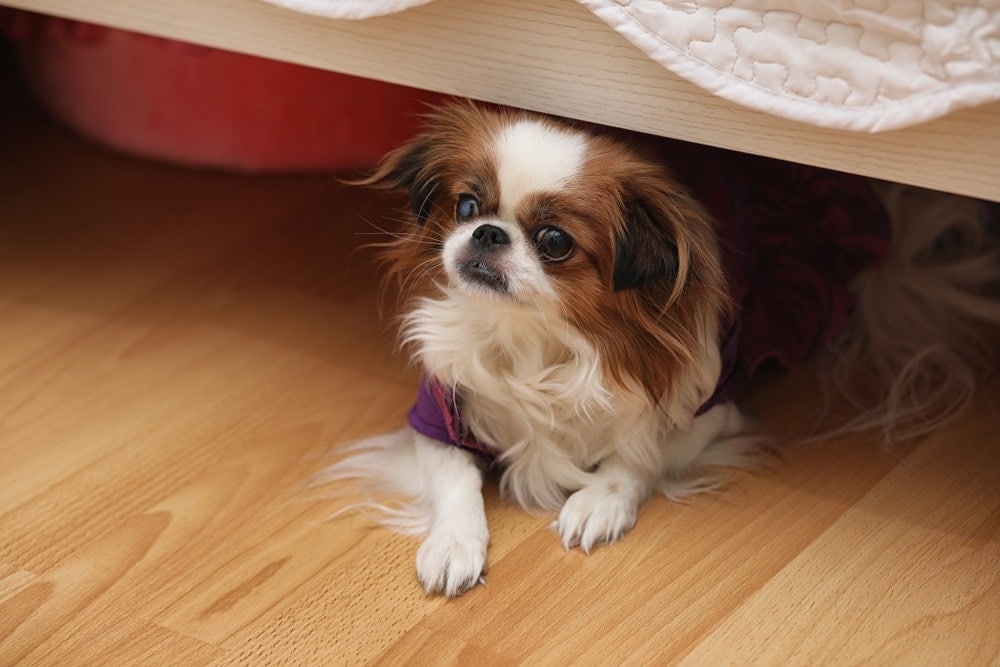
 Things to Know When Owning a Chin-Wa
Things to Know When Owning a Chin-Wa
Food & Diet Requirements 🦴
The Chin-Wa is an extraordinarily small dog and eats an equally small amount of food. They don’t need much activity either, so their metabolism does not tend to boost their appetite. Feed them approximately 1 cup of food each day.
Watch their weight. These dogs tend to be naturally thin. However, since they do not exercise much, they can add weight quickly without getting the opportunity to burn it off. If they do, they can experience numerous joint and muscle issues that they wouldn’t otherwise suffer.
Exercise 🐕
These pups only have moderate exercise needs. With their little legs, they can achieve the amount quickly and tire out after only a short period.
If you like to take your pup for walks, aim for a distance of around 5 miles each week. Otherwise, give them 30 minutes of activity every day. Activities can be playing games in the backyard, going on walks, or being taken to the dog park.
Training 🦮
The Chin-Wa is a relatively tricky breed to train because they are stubborn. If they lose interest in something, it is hard to convince them to pay attention again. Try to turn training into a game. Use positive reinforcement to show them that they are doing a good job and making you happy.
These dogs respond really well to training with treats. However, if you do use treats, make sure that they don’t exceed 10% of their total diet. Establish yourself as their authority, and they are less likely to become stubborn with you.
Grooming ✂️
It would seem as though one of them would be, but neither the Chihuahua nor the Japanese Chin is hypoallergenic. The Chin-Wa, therefore, is not either. They are a low-maintenance breed when it comes to their grooming, though. They do not shed much and only need to be brushed around once a week.
The type of brushing, comb, and general grooming they should receive depends on whether they have short hair or long hair. Use a pin brush and a slicker brush. Change them up depending on what ends up being most effective with their coat’s texture.
Clip their nails when needed. They can have erect or floppy ears. If they have floppy ears, they need to be cleaned more frequently. Wash them out carefully at least once a week to remove any moisture or debris buildup and prevent ear infections.
Health and Conditions ❤️
Check the health history of the parents before adopting a puppy. They give you a better idea of the types of diseases that this breed is prone to suffer from, so you are prepared.
- Cataracts
- Hypoglycemia
- Allergies
- Shivering
- Tracheal collapse
- Patellar luxation
- Liver shunts
- Heart murmurs
Male vs. Female
There are no noticeable differences between males and females of this breed.
3 Little-Known Facts About the Chin-Wa
1. Chihuahua’s theoretically hail from ancient Mexican shores.
Many believe that Chihuahuas originated in Mexico. They are one of the smallest breeds of dog we currently have. The Toltec people are thought to have raised the Mexican pup and one of their ancestors, the Techichi.
The Techichi was a small, hairless dog supposedly brought over the Bering Strait from Asia to Alaska thousands of years ago. They were raised as a commodity for the Toltecs. These pups were sold for both food and pets among their people. Eventually, with the arrival of the Spaniards pushing the breed into overuse and extinction, the Chihuahua breakaway from the breed remained.
There is another theory that the Chihuahuas were brought to Latin America by the Spaniards. However, there is no traceable lineage for them from the Iberian peninsula.
2. The Japanese Chin is thought to have originated in China.
The Japanese Chin has an unstandardized history, though their first recorded origins, regardless of the name, came from China. They are thought to have been developed in the Chinese imperial court and were then given away as royal gifts.
Some believe that the dog comes from the Chinese ancestor, the Pekingese, or vice versa. However, the beginning of both species is relatively unknown. It is not altogether clear how the dog came to their place in the Japanese imperial courts, though they quickly established themselves upon introduction to the country.
They began to be raised by each Japanese noble family, who all preferred their own standardized versions of the dog. Because of this, they didn’t have a standard for hundreds of years, and the dogs’ different lines gave them an enormous variation in body shape, coat pattern, and facial features.
3. The AKC accepted the Japanese Chin before the more common Chihuahua.
The Japanese Chin was theoretically traded along the Silk Road to Europe. It was here that they had some influence on multiple other breeds of the time. However, this was not how they eventually came to America to claim their position as one of the first accepted breeds by the American Kennel Club.
Japan closed its borders to all incoming foreigners in 1636 to help conserve its culture and economy. This self-imposed isolation lasted for over 200 years. Then, Commodore Matthew C. Perry made contact with Japan in the mid-1850s. During this period, Western culture began to flood back into the country.
The Commodore had received orders to enter Japan from U.S. President Franklin Pierce, who had the support of Queen Victoria of Great Britain. When Perry accomplished establishing trade posts between the empire and the Western world, he loaded up his ships with many gifts. These were for himself, the Queen, and the President.
These gifts included pairs of Japanese Chin pups for each of them. However, only two dogs survived the voyage, and Perry gifted these to his daughter, Caroline Perry, who later married August Belmont. Their son, August Belmont, Jr., served as president of the AKC from 1888 to 1915. This history was how the Japanese Chin became a popular breed in 1888, even though the pair was never bred.
 Final Thoughts
Final Thoughts
The Chin-Wa is a breed to consider if you want a dog that will adore you. This Japanese Chin and Chihuahua mix appreciates being showered with attention and love and will do the same in return. Even though they are vocal and make their presence known, they are also a low-maintenance breed overall.
- See also: Poochin (Japanese Chin & Poodle Mix)
Featured Image Credit: studio hoto, Shutterstock
 Chin-Wa Puppies
Chin-Wa Puppies
 Things to Know When Owning a Chin-Wa
Things to Know When Owning a Chin-Wa

